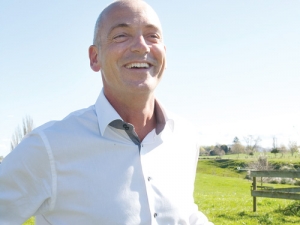Fonterra doesn't believe it will take much to change the global dairy market, but it expects very little change this year.
And therein lies the problem confronting the co-op: the days are gone when it could announce a 4% drop in milk production that spooked the world and lifted dairy prices. The ability of Fonterra, the world's largest dairy exporter, to influence prices has been overshadowed by world economic issues, geopolitical crises and phenomenal milk production.
Last month, Rabobank analyst Thomas Bailey told the Federated Farmers Dairy council conference in Nelson that historically when NZ milk production dropped, prices shot up. But not this season: despite analysts' forecast 10% drop in milk production prices kept falling.
Bailey noted Rabobank was forecasting NZ milk production to be down at least 5%.
"But prices did not respond; they continued to drop... because [buyers] knew they could just go to Europe to get that milk now. NZ appears to have temporarily lost the advantage of influence on prices."
Bailey says NZ's inability to influence prices is one of five "tectonic shifts" happening in the dairy industry. Others are the growth in Europe's milk production, demand slowdown in China and Russia, low oil prices and growing appetite for value added dairy in the US.
Last week Fonterra dropped its milk forecast payout by another 25c/kgMS, blaming imbalance in global demand and supply.
Fonterra chief executive Theo Spierings alluded to his 'two buckets' theory. He says in one bucket are things Fonterra can control – shifting significant milk volumes into higher value added products, keeping costs down and focusing on capital spending and cashflow.
"All across the business there's a high focus on these things," he says.
The second bucket contains what Fonterra cannot control. On the supply side, milk production in Europe is still growing, with limited farmer reaction to lower prices.
Spierings points out that the EU tends to be on longer contracts than Fonterra's three-month GDT contracts.
"We can't really talk for European farmers; we have done some analysis and the longer contracts take more time for milk prices to go down. Potentially, every farmer will react to price signals and that will kick in in Europe as well."
There is some good news on the US dairy front: the US domestic market is doing well, resulting in more local consumption and less exports.
However, the demand scenario remains fuzzy: China is recovering but more more slowly than Fonterra expected, says Spierings.
"We see growth but not the historic double digit growth; it's not there, it is growing at 4-5%."
Russia still has a ban on dairy imports from western countries and demand there has also been hit by lower oil prices.
"In oil producing countries we are seeing stable or lower imports due to low oil prices," Spierings says.
Add to that the conflict in Syria and the recent lifting of sanctions on Iran, and the uncertainty continues.
So what does Fonterra expect to happen over the next nine months?
Spierings says whole milk powder, hovering around US$1900/tonne, will stay around those levels.
"The price is unsustainable so supply reaction will have to take place," he says.
"Our forecast is based on no significant changes to either supply or demand globally before the end of the year. However, a reduction in the supply available for export before then could mean prices recover earlier than currently expected," says Spierings.
Whatever happens over the next nine months in the global markets, only one thing is sure: it's out of Fonterra's hands.



















